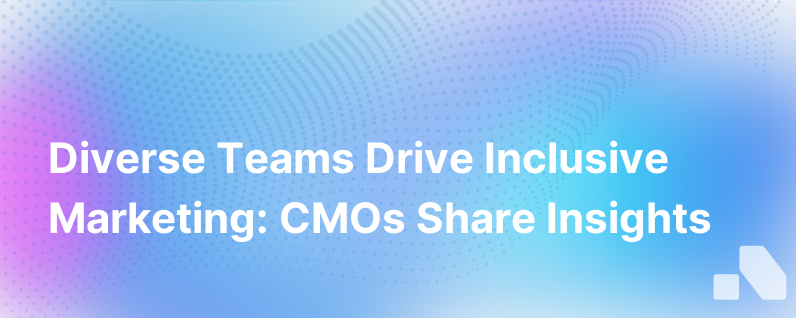
Diverse Teams Create Inclusive Marketing: Reflections and Lessons from CMOS
In the dynamic landscape of global marketing, the push for diversity and inclusion is not just a social ideal but a business imperative. Today's Chief Marketing Officers (CMOs) are not only brand strategists and growth drivers but also champions of diversity. It’s a pivot that underscores an emerging truth: diverse teams not only propel inclusive marketing but also foster innovation, creativity, and connection with an increasingly varied customer base.
This transformation within the realm of marketing reflects a broader societal shift. A multiplicity of perspectives from various backgrounds, cultures, and experiences can enhance brand narratives, tapping into new markets and demographics while avoiding the pitfalls of cultural myopia.
Here are reflections and lessons from seasoned CMOs on how building diverse teams and fostering an inclusive environment can have a lasting impact on marketing initiatives.
The Evolving Role of CMOs in Promoting Diversity
The role of the CMO has evolved significantly over the past decade, expanding beyond driving sales and brand recognition to embodying and instilling company values. The push for diversity is the new frontier—internally and externally. A diverse marketing team can pinpoint nuances in multicultural markets, rendering campaigns more authentic and resonant.
Diversity in Teams Invites Varied Perspectives
Marketing thrives on creativity, and creativity flourishes from a multitude of influences. When teams are homogeneous, ideas, perspectives, and potential innovative approaches might be inadvertently stifled. Conversely, diverse teams welcome a variety of viewpoints, often tackling problems and conceiving solutions from angles that might otherwise go unexplored. These varied perspectives are not limited to racial and gender diversity but extend to include age, nationality, ability, and experiences.
Nuance in Storytelling: Inclusive Narratives
CMOs often regard diversity as the linchpin of relatable storytelling—a fundamental element of effective marketing. In an inclusive team, every campaign cradles the potential for nuanced narratives reflecting a broad spectrum of realities. For example, PepsiCo's CMO, Seth Kaufman, emphasized the importance of listening to different voices within the team to create campaigns that have a 'local heart' but a 'global soul.'
Avoiding Cultural Blind Spots
A well-documented gaffe can become a brand's albatross, as seen in missteps by companies that failed to consider cultural sensitivities. A diverse team can act as a bulwark against such blunders, with first-hand insights that can identify and redress potential blind spots.
Reach and Representation: The Business Case for Diversity
Aside from fostering creativity and inclusivity, there's a strong business case for diversity in marketing teams. According to a Nielsen report, diverse consumers are the fastest-growing segment and have a purchasing power that's not to be overlooked. Representation matters, and consumers are showing a preference for brands that acknowledge and represent their identities. A CMO's ability to speak authentically to these audiences can be directly linked to the compendium of experiences encapsulated in a diverse marketing team.
The Journey: Building Diverse Teams
The road to a genuinely diverse team is wrought with challenges and learning curves, as revealed in candid discussions with marketing leaders. Recruitment is the first step, but retention and empowerment of diverse talent are equally important. Here are a few lessons gleaned from the journeys of several CMOs:
Championing Diversity From The Top
Leadership sets the tone. CMOs need to embody the values of diversity and foster an environment where all team members feel seen and heard. This includes programs for mentorship, career progression, and continuous dialogue about the importance of inclusivity.
Creating a Culture of Belonging
Diverse hiring isn't enough. Each member of the team should feel a sense of belonging. Airbnb's CMO, Jonathan Mildenhall, highlighted the need for a culture that doesn't just invite people to the party but encourages them to dance as well.
Continuous Learning and Adaptation
Building a diverse team is an ongoing process that involves learning from successes and mistakes alike. CMOs speak of it as a conscious, proactive approach, reiterating their growth mindset, where feedback and adaptability play pivotal roles.
Leveraging Data and AI
Data and AI tools can aid in removing biases from hiring processes and help in identifying diverse talent pools. Some marketing leaders are leveraging these technologies to build their teams strategically.
Beyond the Moral Imperative
While the moral imperative for diversity and inclusion is clear, the commitment needs to be enshrined in the brand's DNA and analytics. It's not just about doing the right thing, but doing what's right for the business as evidenced through metrics like market share growth and employee engagement scores.
The Impact on Business Outcomes
Marketing leaders have become acutely aware of the impact of diverse teams on business outcomes. For instance, Tommy Perez, Global CMO of ZoeLife Automations, cites that his diverse team has been instrumental in driving a 30% increase in engagement across key global markets, primarily because the campaigns resonated on a profound, culturally relevant level with target audiences.
Conclusion
Investing in diverse teams is an approach that can redefine the way brands interact and engage with their consumers. As CMOs across different industries continue to share their insights and journeys, it becomes apparent that diversity isn't a standalone initiative but an integral thread woven into the fabric of contemporary marketing strategies. It's a commitment to continuously innovate, represent, and connect with the diverse tapestry of global markets. In the end, diverse teams are not just shaping marketing; they're defining the progression of business at large.